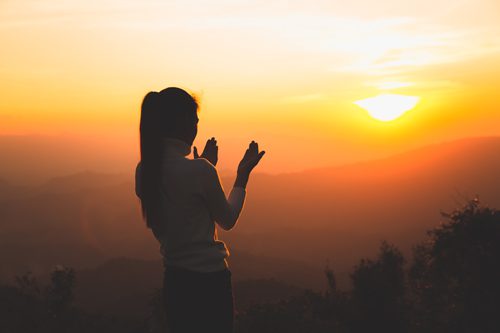 There’s no doubt that we’ve all felt lost, forgotten, betrayed, defeated, attacked, or hopeless in our lives. The simple act of being human includes experiencing all aspects of emotion. How we handle the negative or hurtful feelings depends on our resilience and coping methods. Many people use spirituality to support a healthy response to difficult emotions.
There’s no doubt that we’ve all felt lost, forgotten, betrayed, defeated, attacked, or hopeless in our lives. The simple act of being human includes experiencing all aspects of emotion. How we handle the negative or hurtful feelings depends on our resilience and coping methods. Many people use spirituality to support a healthy response to difficult emotions.
Is Spirituality Religion?
Yes…but also no. The easiest definition of spirituality, according to Vocabulary.com, is that it “has to do with the spirit, not as in ghosts, but as in the essence of being human, your soul or your inner life. Religions usually have defined beliefs, rituals, and guidelines; spirituality is more individual.”
So you might choose to follow a particular religious doctrine to support your spirituality. You can also identify as an agnostic or atheist, yet still have a spiritual component in your life. Additionally, many people don’t label how they believe, think, or act, but still feel spiritually-inclined.
How can you exercise your spirituality without involving religion? Here are some examples:
- Being in nature, which can bring a sense of peace regardless of what is happening in your life.
- Showing purpose through deeds, such as charitable work or helping people in other ways.
- Finding regular moments of gratitude and acknowledging their importance.
- Using mind-body-spirit practices, such as meditation, focused breathing, yoga, tai-chi, or qi-gong.
- Praying, acting from a place of loving kindness toward others, or following specific rituals for grounding and support.
- Finding solace in music or art.
- Choosing to honor not only primary relationships in your life, but also your relationship with humans in general, because you believe we’re all connected.
- Understanding the importance of forgiveness and acting upon it.
These are just a few ways people can be in a spiritual place. While there’s no wrong way to foster spirituality, the methods above can make it more integral to how you live, especially if you want more stabilizing influences for your recovery.
How Spirituality Helps You
Spirituality boosts your health and well-being in many meaningful ways, including, but not limited to:
- You develop better mindfulness so you don’t simply react in negative or triggering situations.
- Your self-awareness expands, which helps evoke feelings of calm and security.
- Your spiritual strength can help you to manage and move beyond hardships.
- Your relationships and sense of belonging improve.
- You find it’s easier to make healthier choices because of the value you assign to them.
In an article for Psychology Today, lecturer and researcher Adi Jaffe points to other benefits of spirituality for people with substance use disorder, such as better accountability for all aspects of your life, connecting to something “bigger than yourself” to have a sense of belonging, making community connections, and developing a greater purpose.
Using Spirituality for a Stronger Recovery
The University of Minnesota (U of M) conducts research and offers spirituality resources through its Earl E. Bakken Center for Spirituality and Healing. In its “Taking Charge of Your Wellbeing” segment, it identifies “seven spiritual hungers” based on the work of psychologist and pastor Howard Clinebell, and we’ll post them here directly from the university’s site.
Clinebell believed that “humans long to”:
- Experience the healing and empowerment of love—from others, self, and an ultimate source.
- Experience renewing times of transcendence—expansive moments beyond the immediate sensory spheres.
- Have vital beliefs that lend meaning and hope in the midst of losses, tragedies, and failures.
- Have values, priorities, and life commitments centered in issues of justice, integrity, and love to provide guidance in personally- and socially-responsible living.
- Discover and develop inner wisdom, creativity, and love of self.
- Develop a deepening awareness of oneness with other people, the natural world, and all living things.
- Have spiritual resources to help heal grief, guilt, resentment, unforgiveness, self-rejection, and shame and deepen experiences of trust, self-esteem, hope, joy, and love of life.
So one way to start cultivating more spirituality in your life and support your sobriety is to review this list. If you have a “hunger” in a certain area or if one need requires more of your attention, look for resources to help.
Through U of M, you’ll find resources such as:
- Learn how to discover your calling
- Increase positivity through deliberate intention
- Identify your values
- Find methods for nurturing your spirituality
- How to give back and become more involved
Another comprehensive source of information is Spirituality and Health. Through its magazine, podcast, website articles, and other information, you’ll learn about practices to cultivate your spiritual side.
Just as you have to learn new techniques for coping with stress, you might find it takes time not only to find your spiritual center, but also become comfortable with it. Remember: intention makes all the difference.
A Whole Person Approach to Healing
We understand that addiction affects the mind, body, and spirit. We never want anyone to feel their recovery journey is a solitary path without encouragement and support. Read more of our blog posts for additional resources that light the way. If you feel you need more direct assistance, we offer continuing care programs to take you to the next level.



